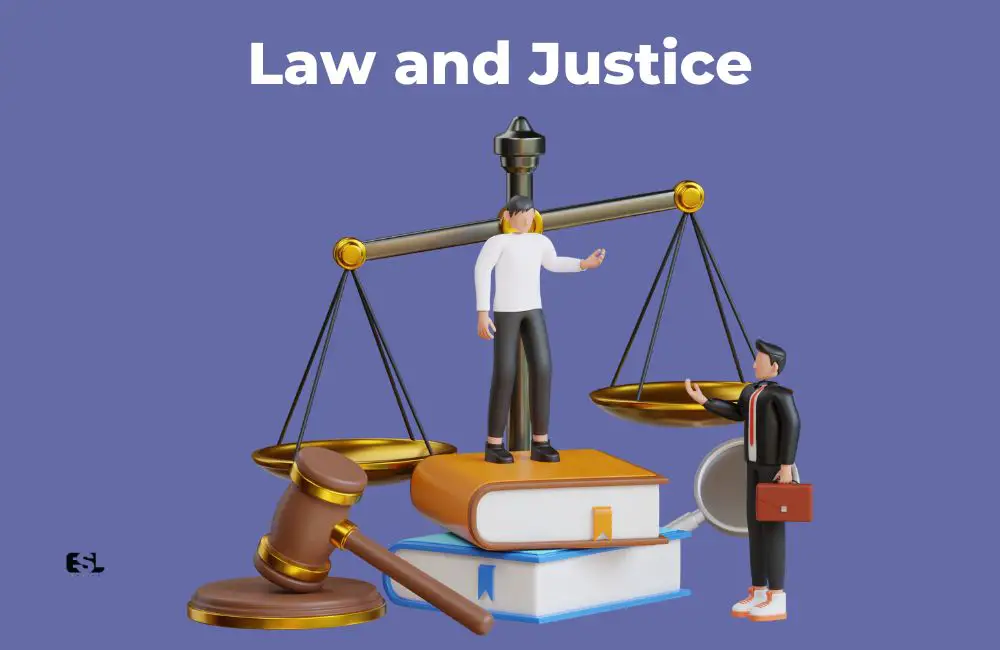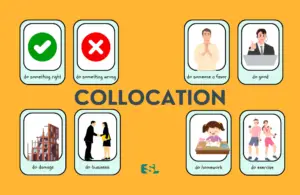Legal terminology can often seem like its own separate language, inaccessible and intimidating to those outside the legal profession. Yet, understanding key legal terms can be valuable in many life situations, from understanding a contract to watching a courtroom drama on television.
This article aims to demystify the language of the law, introducing and defining common legal terms across various areas of law and justice.
Table of Contents
- 1. Basic Legal Terminology
- 2. Criminal Law Terms
- 3. Civil Law Terms
- Sample Conversation: Using Vocabulary Related to Law and Justice
- Conclusion
- FAQ: Vocabulary Related to Law and Justice
1. Basic Legal Terminology
We begin with some fundamental terms used in legal contexts.
| Word/Phrase | Meaning/Usage | Example Sentences |
|---|---|---|
| Plaintiff | The person who brings a case against another in a court of law | “The plaintiff argues that she was unfairly dismissed from her job.” |
| Defendant | An individual, company, or institution sued or accused in a court of law | “The defendant pleaded not guilty to the charges.” |
| Litigation | The process of taking legal action | “The company is involved in numerous litigation cases.” |
| Verdict | A decision on a disputed issue in a civil or criminal case | “The jury delivered a verdict of not guilty.” |
| Subpoena | A writ ordering a person to attend a court | “The witness received a subpoena to appear in court next week.” |
| Deposition | The process of giving sworn evidence | “The attorney conducted a deposition with the witness.” |
| Affidavit | A written statement confirmed by oath or affirmation, for use as evidence in court | “The witness provided an affidavit detailing what they had seen.” |
| Acquittal | A judgment that a person is not guilty of the crime with which the person has been charged | “The defendant was hoping for an acquittal.” |
| Perjury | The offense of willfully telling an untruth in a court after having taken an oath | “He was found guilty of perjury for lying in his testimony.” |
| Probate | The legal process wherein a will is reviewed to determine whether it is valid and authentic | “The will is currently going through probate.” |
| Habeas Corpus | A writ requiring a person under arrest to be brought before a judge or into court | “The prisoner filed a habeas corpus petition to challenge his imprisonment.” |
To elevate your vocabulary in just 30 days, I recommend to my students an informative, fun, and accessible guide to utilizing powerful language. Millions of individuals have enhanced their academics, job skills, and confidence by dedicating just fifteen minutes daily to the exercises and tests of 30 Days to a More Powerful Vocabulary (Amazon Link), a top-selling. It offers step-by-step methods to bolster language prowess, discover compelling words, and daily vocabulary enhancement with pronunciation guidance.
2. Criminal Law Terms
Criminal law deals with crimes and their punishments. Here are some commonly used terms in this area.
| Word/Phrase | Meaning/Usage | Example Sentences |
|---|---|---|
| Felony | A serious crime, typically one involving violence or fraud, punishable by imprisonment for more than one year or by death | “Armed robbery is considered a felony.” |
| Misdemeanor | A minor wrongdoing, less serious than a felony | “Driving under the influence is a common misdemeanor.” |
| Bail | The temporary release of an accused person awaiting trial, sometimes on the condition that a sum of money be lodged | “He was released on $50,000 bail.” |
| Plea Bargain | An agreement in a criminal case where the prosecutor and the defendant agree to a plea of guilty to a lesser charge or to a reduced sentence | “His attorney negotiated a plea bargain to avoid a trial.” |
| Probation | The release of an offender from detention, subject to a period of good behavior under supervision | “He was sentenced to a year of probation instead of jail time.” |
| Parole | The release of a prisoner before the completion of a sentence, on the promise of good behavior | “He was granted parole after serving five years of his sentence.” |
| Arraignment | A formal reading of a criminal charging document in the presence of the defendant to inform them of the charges against them | “At the arraignment, the defendant pleaded not guilty.” |
| Extradition | The act of sending a person back to their home country or state to face criminal charges | “The fugitive is facing extradition back to the U.S.” |
| Warrant | A document issued by a legal or government official authorizing the police or another body to arrest, search, or do something else to a person or property | “The police executed a search warrant on his house.” |
| Capital Punishment | The legally authorized killing of someone as punishment for a crime | “Many countries have abolished capital punishment.” |
3. Civil Law Terms
Civil law covers a broad range of legal matters, including contractual disputes, divorces, and property law. Here are some terms used in this context.
| Word/Phrase | Meaning/Usage | Example Sentences |
|---|---|---|
| Tort | A wrongful act or an infringement of a right leading to civil legal liability | “Negligence is a common tort in personal injury cases.” |
| Injunction | A judicial order that restrains a person from beginning or continuing an action threatening or invading the legal right of another | “The judge granted an injunction to stop the publication of the book.” |
| Alimony | A husband’s or wife’s court-ordered provision for a spouse after separation or divorce | “He was ordered to pay alimony to his ex-wife.” |
| Mediation | Intervention in a dispute to resolve it | “They agreed to try mediation before taking the matter to court.” |
| Lien | A right to keep possession of property belonging to another person until a debt owed by that person is discharged | “The bank has a lien on the property until the mortgage is paid off.” |
| Defamation | The action of damaging the good reputation of someone, includes slander and libel | “She is suing the newspaper for defamation.” |
| Breach of Contract | A legal cause of action in which a binding agreement is not honored by one or more of the parties | “He sued his former employer for breach of contract.” |
| Power of Attorney | The authority to act for another person in specified legal or financial matters | “Her daughter holds power of attorney in case of illness.” |
| Easement | A right to cross or otherwise use someone else’s land for a specified purpose | “They granted an easement to the city to build a bike path.” |
| Custody | The protective care or guardianship of someone or something | “In the divorce, she was awarded custody of the children.” |
If you are searching for an effective English language vocabulary builder, try Word Power Made Easy: The Complete Handbook for Building a Superior Vocabulary (Amazon Link). This time-tested classic has helped millions achieve mastery of English and improve their communication skills in business, the classroom, and in life.
Sample Conversation: Using Vocabulary Related to Law and Justice
Situation: In a library’s quiet study room, Sam, a law student, and Jamie, a journalism major, discuss a recent high-profile court case.
Sam: Hey Jamie, I’ve been following that defamation case closely. It’s intriguing how the “plaintiff” presented their “evidence” and how the “defense” countered it.
Jamie: I’ve been covering it for our college newspaper. The “testimony” from the key witness was truly pivotal. But I’m still trying to grasp some legal “terminology”. What exactly is “precedent”?
Sam: “Precedent” refers to a previous case or legal decision that can be used as a basis in subsequent similar cases. It helps maintain consistency in rulings.
Jamie: Got it. And what’s the difference between “civil” and “criminal” law?
Sam: Great question. “Civil” law deals with disputes between individuals or entities, often involving compensation. “Criminal” law, on the other hand, deals with offenses against society or the state, like theft or murder, and can result in penalties like imprisonment.
Jamie: That makes sense. It’s fascinating how the “judiciary” ensures the application of “justice”. The “legal proceedings” can be so intricate!
Sam: Absolutely. And each “jurisdiction” can have its nuances. Law is all about the details and interpretation.
Conclusion
The law may seem complex, and opaque, but understanding some of its key terminology can make it more accessible and less intimidating. While this article has covered some of the most common legal terms, it is important to remember that legal language can vary significantly between different jurisdictions and legal traditions. As such, always consult a legal professional for advice on specific legal matters or concerns.
FAQ: Vocabulary Related to Law and Justice
1. What is a “plaintiff”?
A “plaintiff” is a person or entity who brings a case against another in a court of law.
2. How does “testimony” differ from “evidence”?
While both are used to establish facts in a case, “testimony” is the statement made by a witness under oath, whereas “evidence” encompasses a broader range, including physical objects, documents, and testimonies.
3. Why is “precedent” significant in legal practice?
“Precedent” ensures consistency in legal decisions. Courts often refer to past rulings to guide their judgments in current cases, especially when the circumstances are similar.
4. What is the role of the “judiciary”?
The “judiciary” is the branch of government responsible for interpreting the law and ensuring justice. It comprises judges and courts that adjudicate disputes.
5. What’s the difference between “legislation” and “regulation”?
“Legislation” refers to laws enacted by a legislative body, like a parliament. In contrast, “regulation” is a rule or directive made and maintained by an authority, often to implement or clarify legislation.
6. How does “civil” law differ from “public” law?
“Civil” law addresses disputes between private parties, while “public” law pertains to matters affecting the society at large, encompassing areas like constitutional, administrative, and criminal law.
7. What is “jurisdiction”?
“Jurisdiction” refers to the official power or authority of a court to make decisions and judgments. It can also denote the geographical area within which this authority applies.
8. Why is “due process” vital?
“Due process” ensures fairness in legal proceedings. It guarantees that individuals have a right to fair treatment, proper procedures, and an opportunity to present their case.
9. What does “acquittal” mean?
“Acquittal” is a legal judgment that declares a person not guilty of the charges against them.
10. How is “arbitration” different from a court trial?
“Arbitration” is an alternative dispute resolution method where a neutral third party (the arbitrator) makes a binding decision on a dispute, often faster and less formal than a court trial.






